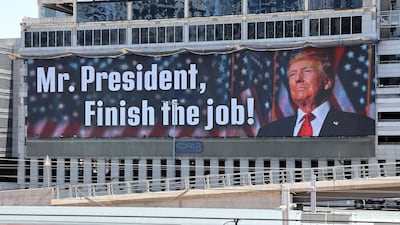In a speech while visiting Riyadh last month, US President Donald Trump attacked America’s foreign policy record in the Middle East, saying the neocons who had tried to “nation build” had wrecked far more countries than they had constructed.
“The interventionalists were intervening in complex societies that they did not even understand,” he told the Arab Islamic American Summit.
The President’s remarks found a receptive audience from Arab observers, who hope America’s future ties to the Middle East will be based primarily on investment partnerships rather than destabilising military entanglements.
But barely one month later, Mr Trump appears poised to let loose America's dogs of war and intervene in a complex society, by joining Israel as it strikes Iran.






For now, Mr Trump is maintaining a degree of strategic ambiguity, saying he “may or may not” strike Iran. But he has dropped some very heavy hints that the US will be helping Israel as it strikes suspected Iranian nuclear sites. On Tuesday, he demanded the “unconditional surrender” of Tehran’s government and said the US could kill supreme leader Ayatollah Ali Khamenei – but prefers not to, “for now”.
Mr Trump has consistently said that Iran cannot have a nuclear weapon, but his increasingly bellicose tone marks a departure from his previous insistence that a deal could be reached with Tehran over its nuclear programme. On Wednesday, he said it was “very late to be talking” and seemed to rebuff what he claimed was an Iranian attempt to restart talks. The vibe in Washington definitely feels more war-war than jaw-jaw.
Iran denied it had asked to “grovel at the gates of the White House”, and the Ayatollah has called Mr Trump’s remarks “unacceptable”.
Much has been made of another potential restraining factor ahead of a war announcement, namely Mr Trump’s Make America Great Again base, which has long insisted the US must not enter another costly overseas conflict. Maga maven Marjorie Taylor Greene said this week that anyone wishing for war with Iran was “disgusting” and lamented America's previous military engagements in the Middle East.
“Anyone slobbering for the US to become fully involved in the Israel/Iran war is not America First/Maga,” she wrote on X. “Wishing for murder of innocent people is disgusting. We are sick and tired of foreign wars. All of them.”
Although he has said he wants to be remembered as a unifier and peacemaker, Mr Trump seems to be leaning into joining Israel’s war – and to an extent already has. The Pentagon has assets positioned across the Middle East and is helping to defend Israeli skies from Iranian missiles.
And as we saw during his military parade at the weekend, which depending on your viewpoint was either a badly attended embarrassment or a patriotic triumph of military might, he loves looking at American materiel in action.
“Nobody does it better than the good ol’ USA,” he said on Tuesday when extolling American military gear, saying that “we” had complete control of Iranian skies, hinting at close co-ordination with Israel as it bombs Tehran.
When asked whether he was concerned a new war would alienate his Maga base, Mr Trump shrugged it off, rightly surmising that there is very little he can do to upset his true believers.
“My supporters are more in love with me today, and I'm in love with them more than they were even at election time,” he said.
Some members of Congress have also begun to assert that they should have a say in whether America goes to war, with bipartisan legislation being introduced to force a vote on military action.
But any prospect of the rubber-stamp Republicans opposing in a meaningful way is remote.
For now, it appears Republican hawks and Israel have more of the President's ear than the Maga wing of his party.
“I'm not looking to fight. But if it's a choice between fighting and having a nuclear weapon, you have to do what you have to do," he said in the Oval Office on Wednesday.




